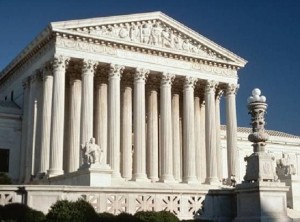 Yesterday was a landmark for the United States Supreme Court: Justice Antonin Scalia agreed with the most liberal members of the bench (Justices Ruth Bader Ginsburg, Sonia Sotomayor, and Elena Kagan) in the Maryland vs. King decision. This, in my opinion, is because Justice Scalia’s more conservative leanings are directly in line with a liberal (read “libertarian”) philosophy on individual liberties — a commonly overlooked liberal principle.
Yesterday was a landmark for the United States Supreme Court: Justice Antonin Scalia agreed with the most liberal members of the bench (Justices Ruth Bader Ginsburg, Sonia Sotomayor, and Elena Kagan) in the Maryland vs. King decision. This, in my opinion, is because Justice Scalia’s more conservative leanings are directly in line with a liberal (read “libertarian”) philosophy on individual liberties — a commonly overlooked liberal principle.
The question before the Court was whether a DNA swab of an arrestee was an unreasonable search in violation of the Fourth Amendment. Under the exclusionary rule, evidence obtained from an unlawful search or seizure cannot be used substantively against a criminal in a trial. King was charged with and convicted of a rape after he was arrested for an unrelated crime, a DNA swab was taken, and the DNA swab matched DNA found on the victim of the rape. If the Supreme Court ruled that the taking of the DNA swab was an unlawful search and obtaining the DNA swab an unlawful seizure, the rape conviction would have been overturned.
The majority of the Court ruled yesterday that the taking of a DNA swab of an arrestee is “like fingerprinting or photographing” an arresttee. The Court ruled in favor of the State.
Antonin Scalia read from the bench, an uncommon practice reserved for expressions of serious discontent with the ruling of the Court, his dissent, which says in relevant part:
“It is only when a governmental purpose aside from crime-solving is at stake that we engage in the free-form ‘reasonableness’ inquiry that the Court indulges at length today. To put it another way, both the legitimacy of the Court’s method and the correctness of its outcome hinge entirely on the truth of a single proposition: that the primary purpose of these DNA searches is something other than simply discovering evidence of criminal wrongdoing… [T]hat proposition is wrong.”
Scalia then rails the Court for deferring to the State and permitting the State to invade individual person’s liberty rights, despite being arrested, simply for the ease of crime detection. He likens it to the “general warrants” issued by the British that were used in the 18th century to harass and intimidate adversaries.
I agree with Scalia. Fingerprinting and photographing is not for purposes of making it easier to catch the arrestee committing other crimes, it’s for ease of identifying a person whom is in the custody of law enforcement for the immediate future. Fingerprinting evidence is not the exact science that television makes it out to be. Searching a database for fingerprinting is laborious and often fruitless. Comparatively, DNA evidence is never used as a means for identifying an inmate and is exacting evidence of identification of a person with only negligible error. These officers are not taking information for purposes of identification, it’s for purposes of investigation.
Our liberties were heavily eroded as a result of yesterday’s decision. The police have the ability to investigate you for anything that relates to your DNA, if you’re arrested. They are allowed to take a medical sample of tissue from your body in violation of your Federal Health Privacy rights and load it into a database to search again at any date in the future. Soon, every state will pass statutes like those that were upheld in Maryland.
All those opposed to a national gun registry should be taking to the streets because now the government has information far more personal: your medical identity.
Tune in tomorrow for another episode of Talking Law with David Dorer.